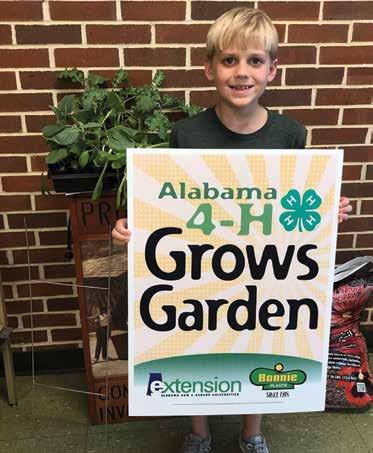
2 minute read
Alabama 4-H Grows
Alabama 4-H Grows Future Gardeners
AUBURN UNIVERSITY, Ala. – Alabama 4-H is cultivating the next generation of young gardeners through its new outdoor education project, 4-H Grows. Through a partnership with Bonnie Plants, the project offers young people hands-on gardening experiences while learning about the field of agriculture.
Advertisement
More than 500 young people, ages 9-18, participated in the project last year. In addition to individual participation at home, several teachers enrolled in the project for use in the classroom.
“Gardening is and can be a wonderful tool to teach responsibility, foster family bonding, build environmental stewardship, introduce scientific concepts – the list goes on,” said Molly Gregg, Alabama Cooperative Extension System assistant

Alabama 4-H Grows participants experiencing hands-on learning.
Alabama 4-H Grows
Alabama 4-H Grows promotes the use of raised beds or in-ground gardens making the project more accessible. Young people choose participation by tier depending on their level of experience.
• Tier I is for young people with limited gardening space and experience. Participants receive three 5-gallon buckets, along with soil and seasonal plants. The focus is learning to garden and incorporating fresh vegetables into family meals.
• Tier II introduces a community component, requiring participants to donate 10 percent of produce grown to the community.
• The Sweet Potato Challenge is part of the gardening project and encourages young people to grow and submit sweet potatoes for weighing and judging.
• Tier III will be introduced this year. Young people will learn to develop a business plan to sell their produce at local farmers markets.

Alabama 4-H Grows Sweet Potato Challenge participant weighing his sweet potatoes.

Doyle Keasal, an Alabama Extension 4-H Specialist and 4-H Grows Project Coordinator, said 4-H recognized the need for a hands-on gardening project in its curriculum.
“We knew that developing a 4-H gardening project that directly engaged youth was needed in Alabama,” Keasal said. “Youth involved in 4-H Grows develop a sense of personal accomplishment as they learn about the field of agriculture. We are looking forward to another successful year.”
Keasal said this spring marks the second year of the Alabama 4-H Grows gardening project.
About Alabama 4-H
For more than 100 years, Alabama 4-H has been helping young people develop into resourceful citizens and responsible leaders. Today, Alabama 4-H engages with more than 178,000 youth.
For more information about Alabama 4-H Grows, visit www.alabama4h.com.





